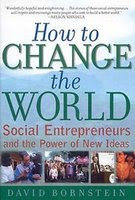
Social entrepreneurship is a core topic of business4good and I have blogged about it
many times (scroll). This includes David Bornstein who one of the most renowned figures in the field and author of
How to Change the World - Social Entrepreneurs which just came out in an updated edition.
Therefore I was happy to read on
Guy Kawasaki's blog 10 questions and answers with David. He makes some interesting links between social entrepreneurship, meaningful action and to happiness (reminding me of books I am reading from the Dalai Lama). Here three little excerpts from David's answers:
1. Bill Gates' Awakening:
"When Bill Gates announced that he would be stepping down from Microsoft to run his foundation, he made it clear that he was not retiring, but rather “reordering” his priorities. Why? It was through his research trips in the developing world that he came face to face with people suffering and dying—and he couldn’t shake it. He saw that he could be more valuable to the world helping to develop AIDS or malaria vaccines, or expanding access to health care systems, than helping to create more software tools, as valuable as those tools may be. Lots of people are coming to similar conclusions. It is like a global awakening."
2. The Bottleneck Fundraising:"Most of our major businesses are able to raise hundreds of millions of dollars in capital markets—through debt or by issuing stock. But social entrepreneurs, who typically run nonprofit organizations, usually have to raise considerable grant funding from foundations, which usually comes in small, short term installments. Because the funding is so fragmented, social entrepreneurs end up spending 80% of their time fundraising, rather than spending 80% of their time focusing on running their organizations. This is a huge bottleneck."
3. Meaningful Action:
"The bottom line is that we focus on the “doing good” aspects, on the sacrifice, and ethical components, but we often forget to mention how wonderful it feels to take meaningful action in line with your core beliefs. Finally people often delay because they just don’t know where to go, what to do, or how to take the first step. So there is a big need for tools that help people find their place in the field of social entrepreneurship and social innovation. That is actually the subject of the current book I am working on."
Read the full interview.

